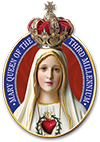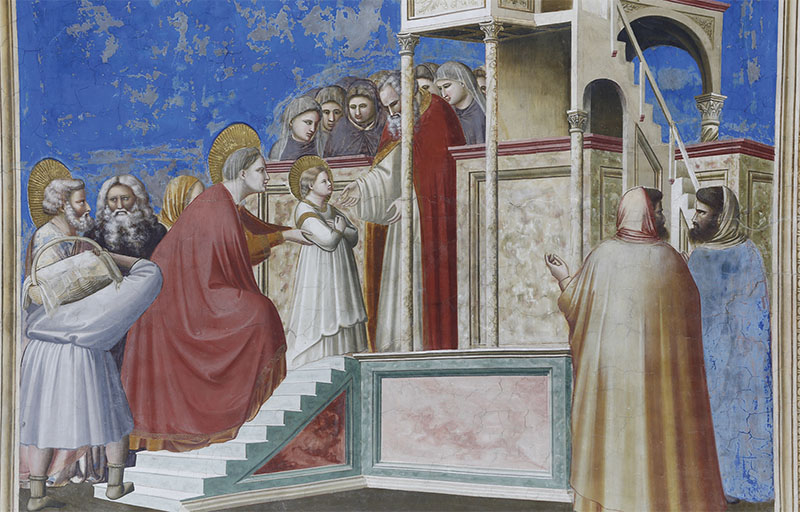Consecrated to the Service of the Temple
The journey from Nazareth to the Holy City took three or four days. At any time of the year it was common to find families or groups of pilgrims on the roads of Israel, going up to Jerusalem or returning from it.
With her attention always on the future Messiah and on His Most Holy Mother, to whom She wished to be a slave, Mary contemplated the picturesque villages and landscapes along the way. This same route would be trodden Years later by the Divine Saviour as He announced the Good News of the Kingdom of God. At times by sapiential analysis of the geographical, social and religious reality before her eyes, and at other times by an interior illumination or even or even aided by a vision, the Child mentally composed the episodes that would unfold in those places: here He would heal a leper, there restore sight to a blind man, yonder confront the perfidious Pharisees, and a short distance further instruct His disciples. The simple meditation on these scenes further enkindled in her Heart the desire for Emmanuel’s coming and the Redemption of the human race.
Wearied from the long journey, they finally arrived in Jerusalem as the sun set on the horizon. Once they were settled, St. Joachim told Her the stirring news: the very next day, at the first hour of the morning, they would go to the Temple for the ceremony in which She would be offered to the Lord.
Ascending to the Temple
Having awoken with the first rays of dawn and finished the final preparations, the holy couple proceeded to the Temple taking little Mary with them. She was radiant with joy at the knowledge that She would be consecrated to God’s service that day, for this had always been her one great desire: to become the Lord’s slave.
Our Lady was dressed in a beautiful lilac-coloured tunic enhanced with delicate adornments; She wore leather sandals and covered her head with a veil that left visible the slightly curled ends of her light, chestnut hair. She walked in silence, with great cognizance and modesty, and held St. Anne’s hand as they climbed the stairs. St. Joachim, in turn, bore a pair of sparrows in a cage, and servants followed behind carrying Mary’s clothing and other belongings.
As they entered the Temple, all three knelt down and prayed in silence: St. Joachim knelt slightly ahead of St. Anne and the Child, imploring graces for the presentation of his Daughter that would soon take place. They accompanied him in recollected fashion a short distance behind. Although there were many other families in this first atrium, the ambience was quite tranquil and free of tumult or commotion.
After concluding this supplication to the Lord, the holy couple headed with Mary to a busier atrium, crossed through some rooms and knocked on a large double door. In a few moments a young woman, wearing a wine-coloured tunic and a white veil, attended to them and politely asked that they wait a moment. She returned some time later with two priests: the high priest that year, an elderly man of evil character who had been in St. Joachim’s house in Nazareth on the occasion of Mary’s birth; and the priest John, who, among other responsibilities, supervised the education of the maidens of the Temple, a task exercised more directly by some mature and experienced ladies.
Both priests were already aware of the reason for the family’s arrival, and the high priest could scarcely hide his displeasure and disquiet at seeing them. Turning to St. Joachim, he tried to dissuade him from his purpose by asserting that Mary was still too young and would not adapt to the rules and regimen of life in the Temple. In reality, he sought to disguise his antipathy, for he had vaguely sensed that this Child’s presence did not augur well for his faction.
The priest John, in contrast, was delighted with Our Lady and felt, in that brief contact, a mysterious revitalisation of all his messianic hopes. As supervisor of Mary’s education, he committed himself before her holy parents to take care of Mary and added that, from her gaze, he could see that She was not only prepared to bear discipline in the Temple, but that She had much to teach her companions.
At the end of this brief conversation at the door, St. Joachim handed Mary the cage with the two little sparrows and She in turn presented it to the high priest. It was a ritual performed by all the maidens who entered the service of God: the two little birds signified their freedom and chastity, consecrated to the Temple by the hands of the sacred minister.
After this brief act, the high priest took his leave. The priest John led them through the door to a secondary room, similar to a very spacious chapel, located in a more secluded area of the Temple and reserved for the most important sacrifices and immolations. Simeon awaited them there. He would officiate at the ceremony of Mary’s presentation, accompanied by the directresses and maidens who would participate.
The rite of presentation
The couple entered from the back of the room and went in procession with the Child to where the priest stood. St. Joachim then proceeded to speak, composing an impromptu prayer:
“At this moment, Lord, we offer our most precious treasure, our dear Daughter, Mary. We give Her to Thee, for Thou deservest the best that we have, that which Thou thyself hast given us. As She enters Thy service in this sacred place, may She walk without stain in Thy presence, her steps never deviating from Thy holy will.”
While still before Simeon, spiritual director of the family since the time of his wedding, St. Joachim made the solemn transfer of his Daughter to the care of the priest John, saying to Her:
“My daughter, I commend You to this son of Levi to be offered to the Lord, that You may serve Him all the days of your life. Be an immaculate offering to the God of our people, and may He visit us with the coming of the awaited Messiah.”
John thus became responsible before God to ensure Mary’s training and protection during her stay in the Temple, though Simeon was her actual spiritual father. The young priest would dedicate himself to this mission with extraordinary zeal and all the force of his soul, under Simeon’s guidance.

